- Home
- Tommy Greenwald
Charlie Joe Jackson's Guide to Not Reading
Charlie Joe Jackson's Guide to Not Reading Read online
CONTENTS
Title Page
Part One: HOW TO NOT READ
Chapter 1
Chapter 2
Chapter 3
Chapter 4
Chapter 5
Chapter 6
Chapter 7
Chapter 8
Chapter 9
Chapter 10
Chapter 11
Chapter 12
Chapter 13
Chapter 14
Chapter 15
Chapter 16
Part Two: THE LOVE OF MY LIFE AND OTHER IMPOSSIBILITIES
Chapter 17
Chapter 18
Chapter 19
Chapter 20
Chapter 21
Chapter 22
Chapter 23
Chapter 24
Chapter 25
Chapter 26
Chapter 27
Chapter 28
Chapter 29
Chapter 30
Chapter 31
Chapter 32
Chapter 33
Chapter 34
Chapter 35
Part Three: IF AT FIRST YOU NEVER READ, DON’T TRY AGAIN
Chapter 36
Chapter 37
Chapter 38
Chapter 39
Chapter 40
Chapter 41
Chapter 42
Chapter 43
Chapter 44
Chapter 45
Chapter 46
Chapter 47
Part Four: IT SEEMED LIKE A GOOD IDEA AT THE TIME
Chapter 48
Chapter 49
Chapter 50
Chapter 51
Chapter 52
Chapter 53
Chapter 54
Chapter 55
Part Five: PLOT TWIST
Chapter 56
Chapter 57
Chapter 58
Chapter 59
Chapter 60
Part Six: ALMOST HOME
Chapter 61
Chapter 62
Chapter 63
Chapter 64
Part Seven: THIS IS THE LAST PART, I PROMISE
Chapter 65
Chapter 66
Chapter 67
Acknowledgments
Dedication & Copyright
My name is Charlie Joe Jackson, and I hate reading. And if you’re reading this book, you hate reading, too.
In fact, you do whatever you can to avoid reading, and the fact that you’re holding a book in your hand right now is kind of shocking.
I know exactly how you feel; I’m one of you.
Just remember: you are not alone. We’ll get through this together.
This book is a guide for people like us.
It will serve two purposes.
One, it will show people how to get out of reading.
And two, on those unfortunate occasions when you’re not able to get out of reading and are forced to read a book, it will be a nice easy book to read.
In all likelihood, you’re reading this book against your will, and I sympathize with you. Therefore, I also make you this solemn promise:
The chapters will be short. The pages will be shorter. And whenever possible, I will keep the words shortest.
One syllable. Or less.
* * *
I’m also going to include some specific tips about reading—or NOT reading—throughout this book.
Some have to do with getting out of reading altogether, which is the strategy I recommend, and some have to do with making the best of it, if you do have to read a book. It can be surprisingly hard to avoid reading a book at some point in your life—even in middle school, as it turns out. You’ll understand more as “our story unfolds.” (One of my book-reading friends, Jake Katz, used that term once when he was describing a paper he was writing. He became somewhat less of a friend right at that moment.)
Charlie Joe’s Tip #1
IF YOU HAVE TO READ A BOOK, MAKE SURE IT HAS SHORT CHAPTERS.
This first tip is pretty self-explanatory. Think about it. If your mom or dad tells you to read three chapters before bed, wouldn’t you rather the chapters be one page each instead of ten pages each? Wouldn’t you rather read three pages instead of thirty pages? That way, you’re reading twenty-seven less pages, but you can still say, “Hey, guess what? I read my three chapters.”
Trust me, they’ll never know the difference.
I’ve hated reading for as far back as I can remember.
I didn’t mind it when my mom read to me when I was little. That was fine because I could stay up later, and sometimes she even fell asleep in my bed, which I have to admit I actually liked at the time.
But then as I got a little older she started to say, “Okay, now you read the rest of the chapter,” and that was just so not going to happen.
So I’d cry, and she’d read some more.
(By the way, I learned to cry on purpose that way. It’s a useful skill. I’ve noticed that girls really like it when a guy gets teary sometimes—like at a movie where the hero makes a supreme sacrifice for his one true love, for example, because that means he’s sensitive or something, and girls seem to like that. Personally, I prefer action movies where somebody blows something up, or a comedy where some chubby guy falls in love with a gorgeous lifeguard who only speaks French. That’s more my speed.)
Anyway, the whole crying-in-front-of-Mom-so-I-wouldn’t-have-to-read-it-myself thing, that worked great until I was about ten.
So here I am in middle school, and I’m proud to say I still hate reading.
Which is how the whole mess began.
It started when I was supposed to read this book Billy’s Bargain for my English class. It’s about this kid, Billy, and the bargain he strikes with the Devil to pitch a no-hitter in the championship game. But, it turns out the Devil is actually just a guy that was hired by Billy’s dad to pretend to be the Devil, because Billy’s dad figures that if Billy thinks he made a deal with the Devil to pitch a no-hitter, then Billy would have the confidence to actually pitch a no-hitter.
It’s not as complicated as I just made it sound. It’s apparently a pretty good book, according to my teacher, Ms. Ferrell. And I guess it’s got one of those just-believe-in-yourself-and-others-will-believe-in-you-too messages that grown-ups want kids to hear over and over.
Anyway, like I said, that’s where I ran into trouble.
* * *
I did what I usually do. I read the back cover, the front inside flap, the first chapter, and the last chapter.
Then I sat next to my friend Timmy McGibney at lunch.
For about two years, Timmy and I had what you might call an “arrangement.” I would buy him an ice-cream sandwich, and he would tell me all about what was in the rest of the book. It was a “win-win” situation, which is one of those weird expressions my parents use all the time.
Naturally, I figured we’d make the same deal we always made.
“So Timmy,” I said, handing him his ice-cream sandwich, “Billy’s Bargain was a pretty good book.”
“How would you know?” he asked. He always asked me that. It was kind of a routine we had.
“Well, the beginning and the ending were pretty good.”
“I guess so,” Timmy said. He was fiddling with his lacrosse stick. Lacrosse was the only thing he loved more than ice-cream sandwiches.
“Tryouts coming up, huh,” I said, pointing at his stick.
“Yup,” he said. I waited for him to say something else, but he didn’t. This was weird. Usually he could talk about lacrosse for hours.
Timmy wolfed down his ice-cream sandwich and looked at mine. “I’m actually really hungry to
day,” he said. “Really, really hungry.”
I suddenly got a pretty uneasy feeling. “What do you mean, ‘really, really hungry’?”
“I’m saying I’m so hungry I could eat two ice-cream sandwiches,” Timmy said. “Maybe three.”
I looked at him in disbelief. We’d had the same deal going for almost a year. I’d handed over enough free ice cream for him to start his own dairy farm. Now all of a sudden he was pulling this!
I looked around. I checked my pocket for money. I considered my options. Then I did the only thing I could do.
I bought him another ice-cream sandwich.
* * *
After lunch I went to the library and looked up the word blackmail just to make sure I understood exactly what was happening.
The librarian, Ms. Reedy, was an old friend of mine, even though she represented everything evil. Back in the old days, she was the librarian at my elementary school, and she used to try anything to get me to read. One time in first grade, she sat me down and had me listen to a song called “Grab a Book and Go,” all about the joys of reading. One of the verses went “Snuggle in your bed, the day is near its end. All alone, but you’re not alone, a book can be a friend.”
I’ve never quite forgiven her.
So needless to say, she gave me quite the double take when I walked in.
“Charlie Joe,” she said, “did you take a wrong turn somewhere?”
I laughed. (Always good to laugh at an adult’s jokes, regardless of whether they’re funny or not.)
“I just need to look something up,” I answered, trying to keep the conversation to a minimum so I could take care of business and get out of there.
Ms. Reedy looked at me and winked.
“Well don’t worry, Charlie Joe, your secret is safe with me,” she said.
I just looked at the previous chapter and realized it was way too long. I just ignored Charlie Joe’s Tip #1!
Sorry about that. Won’t happen again.
Charlie Joe’s Tip #2
NEVER READ A BOOK BY SOMEONE WHOSE NAME YOU CAN’T PRONOUNCE.
Let’s face it: chances are you wouldn’t be reading this book if it were called Venedkyt Styokierwski’s Guide to Not Reading.
And I sure wouldn’t be writing it.
My point is, if you have to read, it’s really important to make sure the cover doesn’t scare you in any way. And that starts with the author’s name. It has to be reader friendly.
Like Charlie Joe Jackson, for example.
When I got home from school that day, I was still annoyed about Timmy’s power move. Two ice-cream sandwiches! What’s next, a Carvel Fudgie the Whale cake?
I threw down my ridiculously heavy backpack—there should be a law against ridiculously heavy backpacks, by the way—and made myself a bowl of cereal.
Then I considered my options:
1. doing homework, which involved reading; or
2. playing with the dogs.
Not a hard choice.
We have two dogs: Moose and Coco. They’re both lab mixes. We rescued them from the pound.
They have a great life: eat, sleep, play, and absolutely no reading of any kind.
I’m sure it won’t surprise you to learn that occasionally I get jealous of both of them.
After I threw them the tennis ball approximately 4,386 times, I managed to forget all about Timmy McGibney and his ice-cream sandwiches.
Temporarily.
Charlie Joe’s Tip #3
THERE ARE ALWAYS WAYS TO GET OUT OF READING.
Here’s a short list:
1. Sleep.
2. Clean your room.
3. Pretend to clean your room.
4. Go outside. Parents love it when you go outside.
5. Practice an instrument. Even if you don’t play one. Parents love it when you practice music without having to be nagged about it.
6. Eat. (My personal favorite.)
7. Feed your book to the dog.
8. Clean up the dog’s throw-up.
9. Run away from home. (Only in extreme cases.)
10. Plead insanity.
“So are you going to tell me what was in the middle of the book, or aren’t you?”
It was the next day, and I was following Timmy and his lacrosse stick around the cafeteria. He still wasn’t telling me what happened in the middle of Billy’s Bargain, and I was starting to panic. I’d bought him two ice-cream sandwiches, a slice of pizza, and three chocolate milks, but nothing.
I suddenly realized that this wasn’t about free food. Something else was bothering Timmy, and I needed to find out what it was.
My non-reading future depended on it.
The first thing to do was to find Katie Friedman, who’d been my best friend from kindergarten to fourth grade, which was when I suddenly realized you weren’t allowed to have a girl best friend.
But even though we technically weren’t best friends anymore, I still told her everything, and in times of crisis she was still my go-to problem solver. I’ve found that in matters of feelings and thinking, girls seem to have a handle on things that guys just don’t. They seem to care more. Or maybe they’re just less afraid to admit it.
And Katie Friedman cares more than everyone else. She gets what you’re telling her, and probably understands what you’re talking about more than you do.
I guess you could say she “reads between the lines,” which is an expression that’s meant as a compliment, even though it has the word reads in it.
But I don’t mean to suggest that I’m in love with her or anything. I’m not. Like I said, we’re just best friends—or would be, if that sort of thing were allowed.
At any rate, I found her in her usual spot, back left corner of the cafeteria by the vending machines, texting the girls right next to her. (You aren’t allowed to text in school, but at recess and lunch everybody snuck in a few.)
I quietly called her over. She put away her phone and followed me around the corner.
“What’s up?”
Katie was the only one who knew about the deal that Timmy and I had. (She was a big reader and constantly told me what a loser I was for hating books, but she gave me points for creativity.) I quickly filled her in on what was going on, and how for some reason all the ice-cream sandwiches in the world weren’t going to make Timmy tell me what was in the middle of that freakin’ book.
She looked at me. Then she laughed.
I was shocked. “What? WHAT?!?!”
She shook her head. “You are so clueless. Why are boys so clueless? Why do they never notice the real things that are going on in the world? It’s bad enough that you refuse to read, Charlie Joe. But would it kill you to go to a movie every once in a while where something actually meaningful happens, instead of some chubby guy falling in love with a gorgeous lifeguard who only speaks French?” (She knew me pretty well.) “You might actually learn something about psychology.” (Katie had recently decided she wanted to be a therapist when she got older, like her parents.)
I wanted so badly to come up with something smart and psychologically impressive to say in return.
But all I could come up with was, “Chubby guys falling for gorgeous lifeguards who only speak French are funny.”
Katie smiled. One of the things I loved about her was that whenever she yelled at me, she always felt really guilty right afterward. And this time, she felt guilty enough to give me the piece of information I’d come looking for.
“The problem isn’t Timmy. It’s Eliza.”
Charlie Joe’s Tip #4
IF YOU WANT GIRLS TO LIKE YOU, DON’T READ.
Girls think it’s kind of cool if you don’t read a lot and still get good grades.
It’s kind of like, you’re smart but you don’t even try.
As opposed to the kids who work really hard and get good grades, or the kids who don’t work at all and get bad grades. Girls don’t really like either of those kinds of boys.
So if you want to get girls, it�
�s important to read as little as possible and still do well in school.
Here’s how:
1. Participate in class. Ask a lot of questions. Seem really enthusiastic.
2. Turn in all your homework on time.
3. Make sure a friend of yours is assigned the same book. And make sure he’s actually reading it.
4. Bring pictures of your dogs to school and show them to your teachers. Make sure the pictures show the dogs doing cute things—the kind of things that get on YouTube.
5. Don’t get in trouble at lunch.
6. Don’t get in trouble at recess.
7. If the book you’re supposed to read was turned into a movie, rent the movie.
8. If the book you’re supposed to read was turned into an audio book, listen to the audio book. (It counts as reading, but it’s not!)
9. Make sure you get great grades in the classes that don’t involve reading—like gym.
10. Partner with someone really smart in science.
11. Read the first and last chapters of all assigned books.
12. (Extra Credit) Always do the extra credit, as long as it doesn’t involve reading.
“Eliza” is Eliza Collins.
Although to be technical about it, she’s one of those girls who doesn’t really need a last name. Like Beyoncé.
That’s because Eliza has been crowned “the prettiest girl in the grade.”
She took over the title in about fourth grade and has held it ever since. You know the type: looks like a magazine model, popular, and there always seems to be like a swirl of energy and hair-brushing and giggling everywhere she stands. People can just be walking by and they get sucked in like she’s the center of a tornado or something. (I actually made up a song for her a couple of years ago when I first saw her in action. “Hurricane Eliza comin’ in, the hottest hurricane in town, you’ll get blown away when Hurricane Eliza’s comin’ down.” The tune I came up with is pretty catchy, but you can’t hear it, because this is a book—another problem with books by the way.)
Rumor has it she’s already been offered a job modeling in Spain next year. (Not just “modeling,” mind you, but “modeling in Spain.” As if just “modeling” isn’t enough.) She walks around in school like she owns the place, which, in a way, she does. And she tends to want the things she can’t have—a pet cheetah, a driver’s license … me.

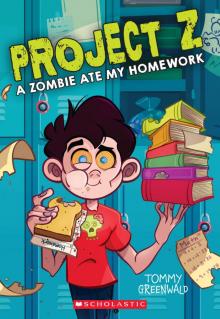 A Zombie Ate My Homework
A Zombie Ate My Homework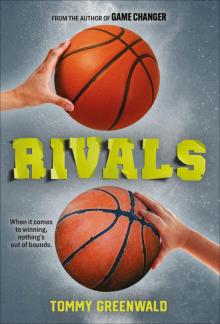 Rivals
Rivals Fangs for Everything
Fangs for Everything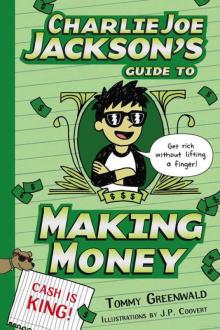 Charlie Joe Jackson's Guide to Making Money
Charlie Joe Jackson's Guide to Making Money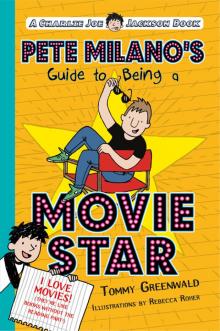 Pete Milano's Guide to Being a Movie Star
Pete Milano's Guide to Being a Movie Star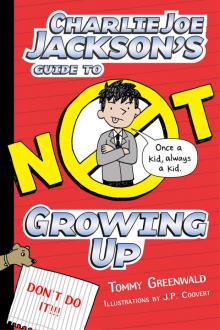 Charlie Joe Jackson's Guide to Not Growing Up
Charlie Joe Jackson's Guide to Not Growing Up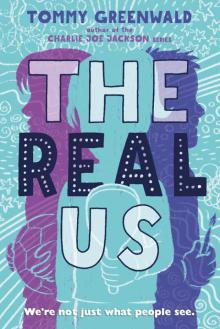 The Real Us
The Real Us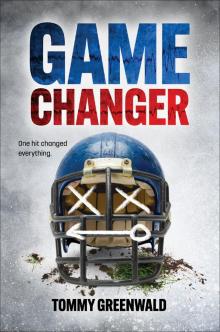 Game Changer
Game Changer My Dog is Better than Your Dog
My Dog is Better than Your Dog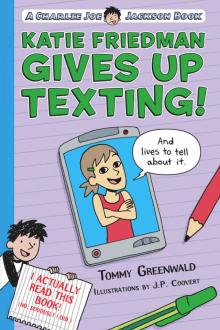 Katie Friedman Gives Up Texting!
Katie Friedman Gives Up Texting!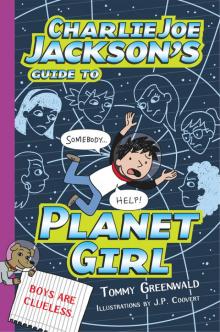 Charlie Joe Jackson's Guide to Planet Girl
Charlie Joe Jackson's Guide to Planet Girl Dog Day Afterschool
Dog Day Afterschool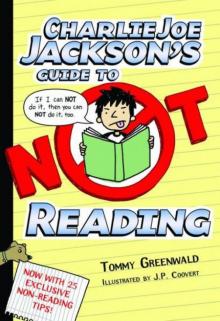 Charlie Joe Jackson's Guide to Not Reading
Charlie Joe Jackson's Guide to Not Reading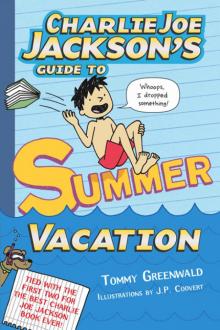 Charlie Joe Jacksons Guide to Summer Vacation
Charlie Joe Jacksons Guide to Summer Vacation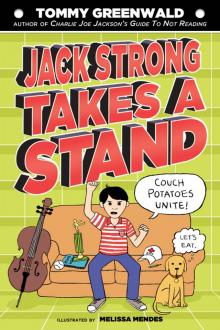 Jack Strong Takes a Stand
Jack Strong Takes a Stand It's a Doggy Dog World
It's a Doggy Dog World